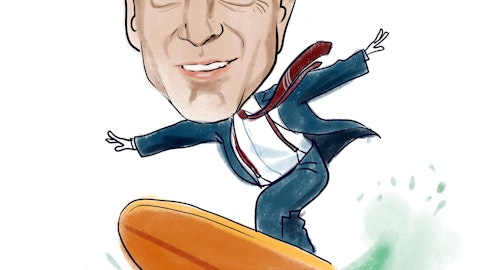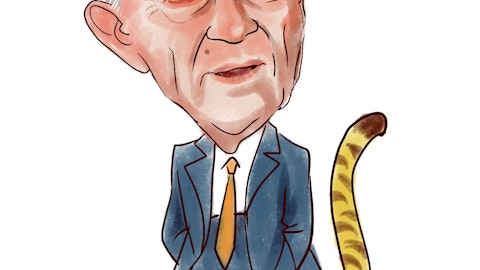
A good story
Avon Products, Inc. (NYSE:AVP) is one of America’s great stories. The direct selling model grew quickly in this country and then expanded overseas. Today, Avon has operations in more than 100 countries, with North American sales making up just 15% of the top line in 2012.
Direct selling is a wonderful model for expanding overseas. It doesn’t require significant investment by the company or the sales agent, and, thus, can expand quickly. That’s particularly true in emerging markets, where the company’s representatives likely don’t have the money to invest in expensive business ideas and have limited access to capital. Avon Products, Inc. (NYSE:AVP) gives them an outlet for their entrepreneurial drive.
The growth potential in emerging markets is huge. Tupperware Brands Corporation (NYSE:TUP), a direct seller of plasticware, kitchenware, and beauty supplies, is projecting the global middle class to expand from 1.8 billion people today to 3.2 billion people by 2020. Emerging markets will account for virtually all of that growth. Avon Products, Inc. (NYSE:AVP), then, should be hitting on all cylinders.
Not living the dream
Unfortunately, Avon Products, Inc. (NYSE:AVP) has been in neutral at best. The company’s bottom line has dipped into the red as its corporate efforts haven’t resonated with its sales force or customers. The 2010 purchase of Silpada, for example, was supposed to add value, but has only hurt performance and muddied the brand. Avon Products, Inc. (NYSE:AVP) has written off almost the entire cost in about two years and is now selling Silpada back to its founders at a steep discount.
The company knows it has problems, however, and the Silpada sale is one step toward fixing them. The list of issues management highlights includes: “Lost sight of who we are and who we serve, Significant talent and leadership gaps, Poor execution and strategic missteps, Lost external focus, and Financial health eroded.”
Fixing things
Selling Silpada will help refocus the company on core brands. The cash salvaged from the investment will go toward shoring up the balance sheet, as will the saving from a dividend cut. Meanwhile, the company is working to streamline its operations and integrate more technology into its business. These are all good steps, but more time is needed for them to take hold.
Investors meanwhile, have largely cheered the company’s efforts, sending the shares up around 30% since the start of the year. That’s too far, too fast for a company that last saw a year over year sales increase during the 2011 holiday season. The top line fell between 20011 and 2012 and is essentially at 2008 levels, the middle year of the deep 2007 to 2009 recession.
A better option
Investors that like the direct selling model in emerging markets should look at Tupperware Brands Corporation (NYSE:TUP). Around 60% of the top line comes from emerging markets and sales have been on a steady climb for a decade. The only notable anomaly was a less than 2% sales decline at the tail end of the recession in 2009. Sales were flat between 2011 and 2012, but a weak third quarter in 2012 was largely to blame. Sales have improved since that point.
Earnings have more than doubled over the decade and the dividend has been increased in each of the last four years. The shares yield nearly 3.2%, however, the price to earnings ratio is around 23. So, the stock is most appropriate for growth and income investors. Income investors, however, might want to keep the name on their watch lists.
A real risk
For really aggressive investors, Herbalife Ltd. (NYSE:HLF) might be the best bet. The company sells health food and personal care items. It is currently facing government scrutiny over accusations from short sellers that it is little more than a Ponzi Scheme. That’s the big risk.
However, the company continues to perform well despite the shadow of the investigation of its business practices. And, the company’s historical growth has been nothing short of impressive. Over the past decade, revenue has gone from $1.2 billion to $4.1 billion. Earnings have gone from $0.35 a share to over $4.00 last year, and the PE is just about 11, with a yield of around 2.7%.
The downside risk is obviously large if the company gets pegged as a Ponzi Scheme, so most should stay away. However, more aggressive growth and income investors willing to bet the company is legit should find this high-risk stock very appealing.
More to be done
Avon Products, Inc. (NYSE:AVP) has a great deal of work to do before it is back on track. It has a good story, but investors appear to be too optimistic at this point. Tupperware Brands Corporation (NYSE:TUP) is probably a better option for the growth minded. For really aggressive investors, Herbalife Ltd. (NYSE:HLF)’s government investigation appears to be dragging down what might be a solid business — if it gets a clean chit.
The article Will Admitting a Mistake Help This Specialty Retailer Improve? originally appeared on Fool.com and is written by Reuben Brewer.
Reuben Brewer has no position in any stocks mentioned. The Motley Fool owns shares of Tupperware Brands and has the following options: long January 2014 $50 calls on Herbalife Ltd. (NYSE:HLF). Reuben is a member of The Motley Fool Blog Network — entries represent the personal opinion of the blogger and are not formally edited.
Copyright © 1995 – 2013 The Motley Fool, LLC. All rights reserved. The Motley Fool has a disclosure policy.





